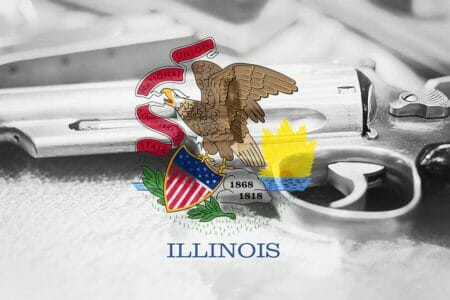
U.S.A. –-(AmmoLand.com)- On June 30, 2022, four plaintiffs filed suit against the District of Columbia, claiming their right to bear arms, protected by the Second Amendment, is being violated by the District of Columbia’s ban on the carry of concealed weapons on public transportation in the district. The case cites the previous cases of Heller, McDonald, Caetano, Wrenn, and Palmer. The crux of the argument presented from the complaint is this:
Under the Second Amendment, the District of Columbia retains the ability presumptively to regulate consistent with the nation’s historical tradition of firearms regulation the manner of carrying arms, including handguns, and may prohibit certain arms in narrowly defined sensitive places, and prohibit the carrying of arms that are not within the scope of Second Amendment’s protection,such as unusually dangerous arms, and disqualify specific, particularly dangerous individuals from carrying arms. See Bruen, slip. op.at 13;Heller,554 U.S. at 627;Wrenn, 864 F.3d at 662-63 & n. 5. However, when such regulations impinge on the ability of law-abiding persons to protect themselves and their loved ones, such laws are invalid unless supported by the text of the Second Amendment or by historical analogues existing at the time of the founding. Bruen, slip op. at 13.
On December 28, 2022, Federal Judge Randolf D. Moss of the United States District Court for the District of Columbia denied the plaintiffs in Angelo v. DC motion for a preliminary and permanent injunction on the District of Columbia’s ban on the carry of concealed weapons on public transportation. His decision depends on the District of Columbia’s precedence that a mere threat of prosecution is insufficient to establish standing to sue in the District of Columbia. From the opinion and order:
As a result, even under the standard set forth in United Farm Workers, the Court is unpersuaded that Plaintiffs have shown that they face a “credible threat of prosecution” or civil fine. See 442 U.S. at 298 (“[P]ersons having no fears of state prosecution except those that are imaginary or speculative, are not to be accepted as appropriate plaintiffs.” (quoting Younger v. Harris, 401 U.S. 37, 42 (1971))).
In sum, then, Plaintiffs have failed to allege that they satisfy the imminence requirement as articulated by the D.C. Circuit in Navegar and Seegars; have failed to persuade the Court that the D.C. Circuit’s precedents are no longer good law or do not control this case; and, indeed, have failed to offer any evidence regarding whether and how § 7-2509.07(a)(6) is enforced. Because “an inability to establish a substantial likelihood of standing requires denial of the motion for preliminary injunction,” Food & Water Watch, 808 F.3d at 913, the Court will deny Plaintiffs’ motion for temporary and permanent injunctive relief.
In effect, Judge Moss is stating a plaintiff will need to be arrested for violating the District of Columbia’s ban on carrying concealed weapons in order to challenge the ban. From law.cornell.edu/constitution:
Although the Court has been inconsistent, it has now settled upon the rule that, “at an irreducible minimum,” the constitutional requisites under Article III for the existence of standing are that the plaintiff must personally have:
1) suffered some actual or threatened injury;
2) that injury can fairly be traced to the challenged action of the defendant; and
3) that the injury is likely to be redressed by a favorable decision.
The plaintiffs in the case allege the threatened injury is clear and traceable to the DC ban on the concealed carry of arms on public transportation.
It is unknown if the case will be appealed to the United States Court of Appeals for the District of Columbia Circuit.
About Dean Weingarten:
Dean Weingarten has been a peace officer, a military officer, was on the University of Wisconsin Pistol Team for four years, and was first certified to teach firearms safety in 1973. He taught the Arizona concealed carry course for fifteen years until the goal of Constitutional Carry was attained. He has degrees in meteorology and mining engineering, and retired from the Department of Defense after a 30 year career in Army Research, Development, Testing, and Evaluation.







Another Obama judge who could GAF about the law.
Judge just proved he is not qualified for the job. Everyone in DC should open carry on the bus and metro every day until the unconstitutional law is abolished.
New precedent, now you have to break the law before you can challenge the law so says “activist judge.”
“Standing” has become a doctrine of avoidance for cowardly or politically ambitious judges when faced with controversial lawsuits. You don’t get to progress from a District Court to the Courts of Appeals in many circuits if you have come down wrongly on certain Sacred Cow issues of the democrats, and this judge used standing as a way to neither offend democrats nor apply the Supreme Court precedent in Bruen that the democrats hate. Imagine a law that said “It shall be an imprisonable offence for any person to say that they believe in God while they are on a subway… Read more »
If district has a law, which presumably carries penalties for exercising constitutional rights – how does that impact on one’s legal ability to exercise one’s rights not constitute an injury? If all the law does is authorize cops to issue nonbinding order to vacate a train or bus, then fine. Verbal harassment by the police falls below threshold of harm. On the other hand, as a rule if you ignore direct verbal orders from an officer – harm will befall you.
Does “injury” include financial loss? I believe it does. Run up few Uber, Lift, and taxi bills and refile, submitting the receipts along with documented public transport costs for the same trips as evidence. And subpoena the head of D.C.’s public transportation in a trial.
So a. CCWL from any state will be revoked because of an arrest in D.C. for a lawsuit to have standing?
So let’s say an 88 year old CCW/ CCHL decides that challenging the law and taking the risk was personally worth it? So he gets arrested . Files an appeal but dies at age 91. The appeal is moot and dismissed. The courts are rigged just like some elections.
did that judge just essentially give that guy a collect 200 pass go in DC by saying he cant challenge the law without being arrested
History does suck, however, it DOES have it’s rewards!
“A Law repugnant to the Constitution is void.” With these words written by Chief Justice Marshall, the Supreme Court for the first time declared unconstitutional a law passed by Congress and signed by the President. Nothing stated in the Constitution gave the Court this specific power.Sep 15, 2022
Marbury v. Madison (1803) – National Archives |
Just carry. The Second Amendment is your permit.